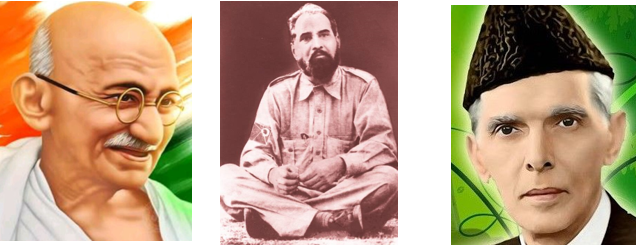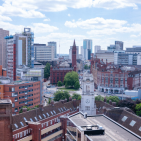People around the world have been made to believe that M.A. Jinnah created Pakistan, that M.K. Gandhi was the champion of India’s freedom, and that the British crushed Allama Mashriqi’s Khaksar Movement. The reality is that Allama Mashriqi was a uniter working to keep India together, whereas Jinnah and Gandhi’s politics played into the hands of the rulers and ultimately resulted in partition. This piece addresses the falsehoods that have been spread with regards to Mashriqi and the other leaders’ role in India’s history.
Most people don’t realize that the British rulers would only accept an Indian leader who was willing to implement British policies. Anyone with knowledge of the past and how politics work would know that no Indian was allowed to enter the Viceroy’s Lodge or have his photos snapped with the rulers (with news flashed across the British controlled media), without agreeing to serve British interests.
Allama Mashriqi was not someone who was willing to follow the British agenda. He founded the Khaksar Tehrik in 1930 to bring freedom to British India. By the late 1930s, Mashriqi had developed a massive following throughout India and the Tehrik had also formed branches in many other countries. The uniformed membership of the Tehrik in India alone was over “five million.” It had become the most disciplined and well trained private army in India. In 1939, upon Mashriqi’s orders, the Khaksar Tehrik successfully paralyzed the Government of the United Provinces (UP) and Sir Harry Graham Haig (Governor of UP) had to sign an agreement with the Khaksar Tehrik just to normalize the situation. Dr. Shan Muhammad writes in his book Khaksar Movement in India, “It [the Khaksar Tehrik] became a most powerful organisation towards the closing years of the thirties and dominated the field…” At the peak, Mashriqi’s speeches regularly had 50,000 to 100,000+ attendees.
With such power, Mashriqi moved forward and decided to topple British rule in 1940. This created panic in British circles. On March 19, 1940, a large number of Khaksars were murdered and Mashriqi, his sons, and followers were arrested. Khaksar activities and publications, including the Al-Islah journal, were banned / confiscated and thereafter the Government moved swiftly to arrest thousands of Khaksars in different parts of India. Mashriqi was imprisoned without a trial for nearly two years and his movements were then restricted for another year; while in prison, Mashriqi and the Khaksars were tortured. But this suppression and brutality ultimately went against the rulers; Mashriqi’s following only grew larger and the freedom movement escalated to the next level. In a letter on March 21, 1940, Lord Linlithgow (Viceroy of India) wrote to Lord Zetland (Secretary of State for India) stating “how great a potential danger the [Allama Mashriqi’s] Khaksar Movement has become.” The correspondence of the Viceroy, Provincial Governors and other high officials repeatedly showed that they feared the Khaksars. On June 6, 1941, Lord Linlithgow wrote to Cunningham (Governor of NWFP), “I felt quite clear after an exhaustive discussion in Council that there was no alternative to the action [i.e. ban on the Tehrik all across India] which the Home Department have now asked all Provinces to take. I have always regarded this movement as potentially a very dangerous one. It is well organized; well disciplined; and it works underground.” On July 19, 1941, Linlithgow (Viceroy of India) again stated in a note to Hallett (Governor of U.P.) that he remained “unshaken” on his perspective that the Tehrik was “a thoroughly dangerous organisation…” Veteran journalist Syed Shabbir Hussain also confirmed in his book (Al-Mashriqi) that “…Mashriqi was considered by the British as the most dreaded person in the sub-continent.” In other words, Mashriqi was not a man who would follow the British policies.
By contrast, the British felt that Muhammad Ali Jinnah was someone who would follow their agenda. Unlike Allama Mashriqi, Jinnah and the All-India Muslim League had no popularity across India in 1940. They did not even have a presence in the Punjab province at the time. In fact, the Muslim League had suffered a crushing defeat in the 1937 elections. Since Jinnah and the Muslim League lacked popularity in 1940, they needed support from the British to gain relevance and would be more cooperative with the British agenda. On May 14, 1940, Viceroy Lord Linlithgow wrote a letter to Secretary of State Lord Zetland stating, “…Indeed, I am sure that Jinnah remains the man to deal with on the Muslim side [Gandhi had already been selected as the man on the Hindu side]. Linlithgow further wrote “…Jinnah is our man and we accept him as a representative of all Muslims” (Khan Wali, Facts Are Facts: The Untold Story of India’s Partition). Linlithgow again would state that the Muslim League “is certainly, I should have said, not disloyal…” The Viceroy’s letters clearly confirm that Jinnah was elevated and recognized as the sole leader of the Muslims (instead of Allama Mashriqi) because he was someone the British felt would be loyal to them. This also explains why Jinnah enjoyed a free hand in India and was not imprisoned.
Similarly, on the Hindu side, M.K. Gandhi was treated like a saint because he too supported the British rulers’ agenda. In reality, Gandhi’s support of non-violence in India and resistance of armed revolt – be it from Mashriqi, Bhagat Singh, or Subhas Chandra Bose – protected British rule. Curiously, Gandhi only seemed to apply the principles of non-violence selectively. For example, he never condemned the rulers when Mashriqi was tortured, his son was killed, and hundreds of Khaksars were brutally murdered at the hands of the rulers. Gandhi (and Jinnah) in fact supported Mashriqi’s arrest and suppression of the Khaksar Tehrik and never demanded Mashriqi’s release.
With the British having their favored leaders in place, all that was left was for each leader to follow the role assigned to him (particularly from 1940 onwards) as part of the British policy of divide and rule; Jinnah would advance the Two-Nation Theory and demand Pakistan, while Gandhi would oppose it. By supporting opposing viewpoints, both leaders furthered communalism, division and rivalry amongst Muslims and Hindus, which enabled them to remain as frontline leaders and the British to maintain their rule; even the body language from photos showing Jinnah and Gandhi with the rulers suggest that they had a partnership. The British were savvy and knew how to play the political game to maintain their rule in India; they used the Indian leaders to fire the shots, while setting the agenda behind the scenes.
Meanwhile, Allama Mashriqi continued fighting for a free and independent India. Recognizing the political games of the British, Mashriqi continued reaching out to Jinnah and Gandhi to form a united front and join hands with him. Mashriqi was opposed to any transfer of power, as he felt it would forever create an inferiority complex for the nation. He had written in his book, Qual-e-Faisal, in 1935 (under the subtitle Khaksar Tehrik Ki Zarurat): “[Translation] You 350 million…if you wanted, you could blow them [with your breath] across Bombay…”
Mashriqi gave Jinnah and Gandhi full assurance that they could topple British rule with the backing of his massive Khaksar army. But Jinnah and Gandhi did not want to stand with Mashriqi because they knew that if Mashriqi toppled British rule, then he would be the one to takeover India’s reign. Unlike Mashriqi, Jinnah and Gandhi did not have street power amongst the masses, so their only choice was to pursue a transfer of power; Jinnah and Gandhi had to work with the rulers or they would have been replaced by others (and there were plenty of others who could have taken over their spots).
As time continued to pass, Jinnah’s constitutional fight and Gandhi’s passive resistance failed to produce any results or bring the country any closer to independence. At the same time, Jinnah and Gandhi’s confrontational politics, which were publicized in the British controlled media, continued to spread hatred and further divide Muslims and Hindus. Mashriqi could see that their politics were delaying freedom and that the British strategy of Divide and Rule was working.
In 1946, Mashriqi decided to move forward with a coup to overturn British rule and to ensure that there would be no further delays in obtaining freedom. Mashriqi distributed a pamphlet in India (on December 1, 1946) proclaiming:
“[Translation] Idara-i-Aliya [Khaksar Headquarters] shall soon issue an order that in the entire India, four million Khaksars [sources quote a range of 4-5 million members], side by side with hundreds of thousands rather millions of supporters shall march simultaneously…This moment shall dawn upon us very soon and that is why it is being ordered that a grand preparation for this historical day should commence immediately…so that British can clearly witness the day of India’s freedom…”
Such a bold proclamation created fear amongst the rulers. Thus, on February 20, 1947, Prime Minister Attlee announced that power would be transferred no later than June 1948. To Mashriqi, this was yet another political game and delaying tactic by the British. In a press statement, Mashriqi mentioned that Attlee’s declaration was a “bugle to start a horrific clash between Hindus and Muslims.” In other words, the rulers would instigate Muslim-Hindu riots and turmoil (by manipulating their favored Muslim and Hindu leaders or through other methods) and then use this as the reason to cancel the transfer of power.
To stop any political maneuvering once and for all, on March 1, 1947, Mashriqi ordered 300,000 Khaksars to assemble in Delhi by June 30th, 1947. The plan was for the Khaksars to take over Viceroy Lodge and important Government offices and installations (including radio and print media). As soon as the Khaksars had completed their mission, Mashriqi planned to announce the end of British rule. These announcements further terrified the rulers because they knew that suppressing such a large number of well-disciplined Khaksars would be impossible. According to the British Home Department’s file, as quoted by Dr. Shan Muhammad in his book: “Government officials apprehended that if the Khaksars were victorious ‘English men, women and children throughout India would be massacred. It would be more disastrous than the mutiny [Royal Indian Navy mutiny in 1946], as it would be a revolution of Muslims throughout India’” (File No. 74/2/40, Pol. Section [I]).
The new Viceroy of India, Lord Mountbatten, who had arrived in Delhi on March 22, 1947 (with the directive to transfer power by June 1948), clearly foresaw the demise of British rule as a result of the imminent coup. Mountbatten fast-forwarded the partition plan so that it could be announced and accepted before the assembly of the Khaksars; he held hurried meetings with Indian leaders and, on May 18, 1947, rushed to England. Within days, he had the said plan approved by the rulers and returned to India in extreme haste on May 31, 1947.
Meanwhile, Mashriqi continued to increase the push for a united overthrow of British rule. On May 14, 1947, in a public meeting in Patna, Mashriqi stated in front of 50,000 attendees:
“The last remedy under the present circumstances is that one and all rise against this conspiracy as one man. Let there be a common Hindu-Muslim Revolution…”
Soon after, Mountbatten landed in India, he invited Indian leaders to discuss the Transfer of Power (TOP). The Tribune (Lahore) dated June 03, 1947 reported, “Urgent call for Gandhiji From Mountbatten [June 02]…To-day is Mahatma Gandhi’s day of silence…” According to Gandhi’s web site (https://www.mkgandhi.org/gandhiji/12dayofsilence.htm), “He won’t talk to anybody on that day. He would not break this rule for any reason…Likewise, he also did not go for a walk on that day.” And yet Gandhi left “for the Viceroy’s House in response to an urgent telephonic call to meet Lord Mountbatten.” The newspaper further wrote that at 10 am, “Mr. Jinnah, President of the All-India Muslim League, was the first one to arrive, followed in quick succession by Pandit Jawaharlal Nehru…” During this rushed meeting, Jinnah, Gandhi, and other leaders accepted the partition plan without even studying its border lines and repercussions.
Prior to the announcement of partition, on June 02, 1947, Mashriqi had once again offered full support to keep the country united. Mashriqi sent an SOS message to Gandhi: “The British are quitting India but leaving it divided…In case you launch a struggle against the division of India on communal or Indian States basis…I respectfully offer about one lakh [100,000]…disciplined volunteers loyally to carry out your orders.” But Gandhi would not go against the British to keep India united.
The next day, on June 3rd, Mountbatten announced the plan in a press conference and declared August 15, 1947, as the date of the Transfer of Power. In the aftermath of this announcement, Jinnah and Gandhi used their influence to ensure that the agreement would also be accepted by the All-India Muslim League and Indian National Congress parties. On June 09, 1947, the All-India Muslim League accepted the partition plan. Allama Mashriqi once again tried to prevent them from dividing the country, but he was “stabbed at a hotel where the Moslem League Council met” (The Canberra Times dated June 11, 1947). A few days later, on June 14, 1947, the Indian National Congress also accepted the partition plan.
The British completed the Mountbatten plan in extreme haste and only allotted a mere 73 days to complete the highly complex division of the country, which would determine the destiny of 400 million people. Gandhi ended his “day of silence” to accept the plan when only a few months prior (on March 31, 1947) he had stated “partition…will be over my dead body.” In fact, just days prior to Mountbatten’s return to India (on May 25, 1947), Gandhi had vehemently spoken in favor of a united India at prayer meetings. Similarly, Jinnah shockingly accepted a “truncated, mutilated and moth-eaten Pakistan” (The Tribune, June 04, 1947), when on May 27, 1947 he had said: “I am, therefore, deadly against the partition of Bengal and the Punjab and we shall fight every inch against it.” Mashriqi was stabbed on the same day that the Muslim League accepted the partition plan. And the plan was accepted by all sides only a few weeks prior to the planned assembly of 300,000 Khaksars in Delhi.
So why was the Transfer of Power completed in such haste? While historians have provided some flimsy and illogical reasons, the reality is that there was no compelling reason for this rush, other than Mashriqi’s planned coup. Keep in mind that India was a very lucrative and strategically important country for the British Empire and they would not have abandoned their rule in such a hurry without a very serious threat. It is clear that the British “Transfer of Power” was not a voluntary one; it was the direct result of the actions and threat of the Khaksar Tehrik. The British were in a panic and knew they had no choice but to transfer power…or else their power would be ended by Mashriqi’s coup. And Jinnah and Gandhi knew that in order to maintain their political relevance, they had to accept partition…otherwise Mashriqi would have achieved a united independence for India, leaving no role for them.
Following partition, Jinnah and Gandhi were rewarded for their loyalty to the British. Jinnah was declared the Founder of Pakistan and appointed Governor General and Gandhi was accepted as the champion of India’s freedom. To this day, the British establishment continues to honor them with statues, artifacts in museums, conferences, and articles. As recently as April 22, 2022, UK Prime Minister Boris Johnson laid a wreath at a Gandhi memorial. If Jinnah and Gandhi had truly ended British rule, then why would the British establishment offer their respects? Is there any other example where a Government promotes the people who brought down their rule?
Meanwhile, Allama Mashriqi’s role continues to be suppressed because he opposed the British throughout and forced them to leave India. Mashriqi’s contributions and works have been confiscated, destroyed or concealed and he is not honored with statues or artifacts. Not a single British writer has published a book on Mashriqi (giving him credit for ending British rule) and even the University of Cambridge, where Mashriqi broke all previous academic records, has not placed a plaque or created a Chair to discuss his role in the freedom movement.
The establishments in Britain, Pakistan, and India promote Jinnah and Gandhi (while suppressing Mashriqi) because it maintains the narrative that Muslims and Hindus wanted partition and that it was indispensable. And politicians in Pakistan and India continue to win elections on the back of communal politics. So, keeping communal politics alive benefits the three establishments, while unification would be against their policies and interests.
Jinnah and Gandhi’s politics and support of partition, when Mashriqi was on the verge of toppling British rule, ultimately destroyed the pride of nation; the transfer of power created an inferiority complex among the people and partition resulted in devastating consequences for the region. At least one to two million innocent Muslims, Hindus, Sikhs, and others were slaughtered. Millions were uprooted and lost their homes. Partition separated blood relatives and tens of thousands of females were raped and abducted. Devastation at this scale has rarely been seen in human history. With partition, two enemy nations came into being and the Kashmir issue began, which resulted in bloodshed that still continues today. Because of the enmity that exists between Pakistan and India, huge sums of money have been spent on building arms, including a nuclear arsenal. And poverty in the region continues to be widespread. By contrast, Allama Mashriqi’s vision of a united India and peace and unity among Muslim, Hindus and all other races would have been much better for the nation and the world. I call upon human rights organization and activists to condemn partition and the Two-Nation Theory. In order for a lasting peace to be achieved, the truth needs to finally be revealed.
By Nasim Yousaf


















